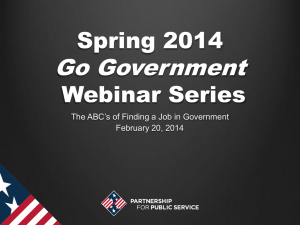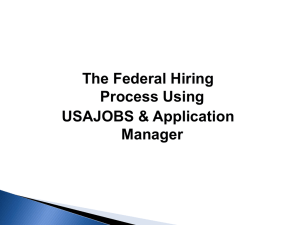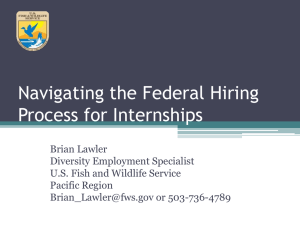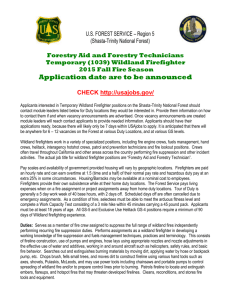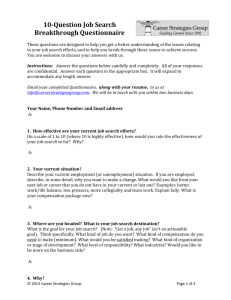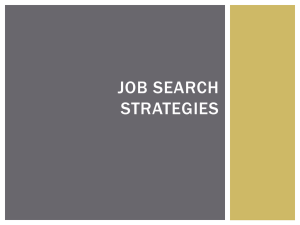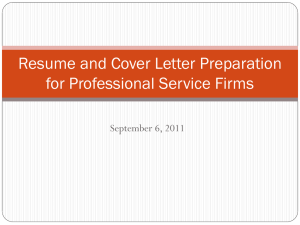Today`s Objectives - Job Connection Education Program
advertisement
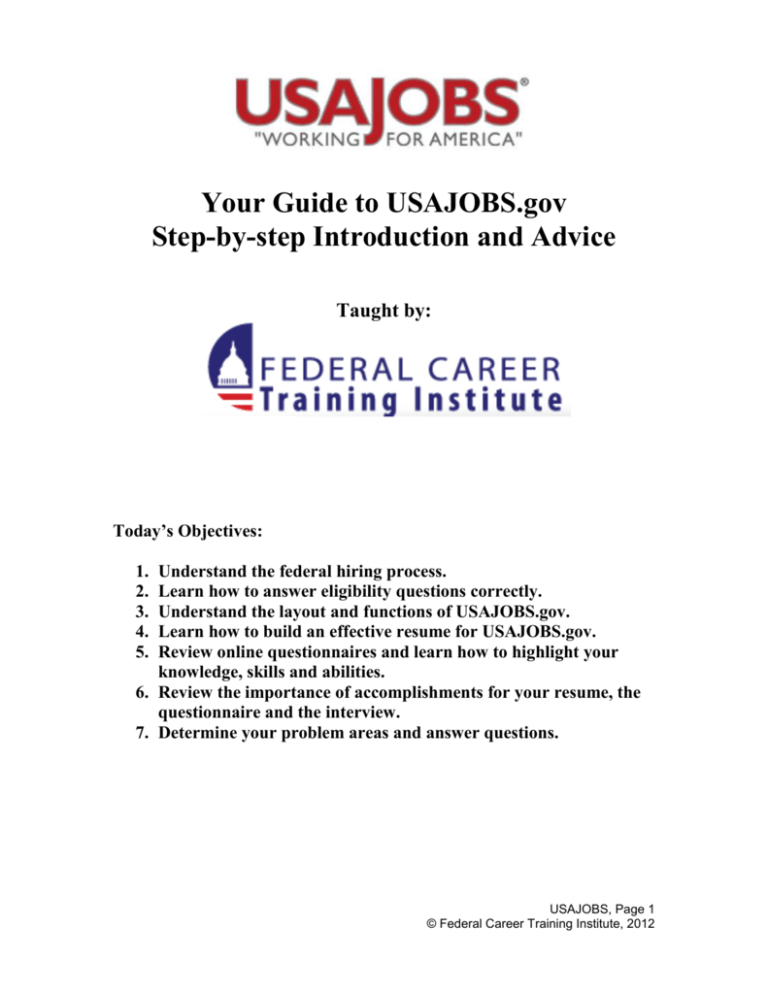
Your Guide to USAJOBS.gov Step-by-step Introduction and Advice Taught by: Today’s Objectives: 1. 2. 3. 4. 5. Understand the federal hiring process. Learn how to answer eligibility questions correctly. Understand the layout and functions of USAJOBS.gov. Learn how to build an effective resume for USAJOBS.gov. Review online questionnaires and learn how to highlight your knowledge, skills and abilities. 6. Review the importance of accomplishments for your resume, the questionnaire and the interview. 7. Determine your problem areas and answer questions. USAJOBS, Page 1 © Federal Career Training Institute, 2012 Getting Started Log in: Write down your password! Applicants routinely complain that they forget their password, which must include numbers, symbols and letters. Make sure you link your account to a personal email, not a work email so that you can access it at home. Edit Your Profile: Answer carefully! The profile section of USAJOBS will pop up when you register or can be accessed by clicking on “Edit Profile” on the Main page. You will be asked to enter Personal Information, Hiring Eligibility, Preferences, Demographic info, and Account Information. USAJOBS, Page 2 © Federal Career Training Institute, 2012 1. Personal Information: You can enter your career goal, but HR does not routinely read it. It could be more important if your resume is “searchable” and you have a unique skill set. 2. Eligibility: Your answers to these questions can determine whether or not your resume and application ever makes it to human resources. So, answer carefully. U.S. Citizen: Most federal jobs require citizenship. Selective Service: If you are a man, did you sign up for the draft? Many times you may not remember doing so but it is a normal part of getting a driver’s license, voting, etc. Veteran’s Preference: Veteran’s must know their preference eligibility You can determine your preference eligibility at the following website: http://www.opm.gov/StaffingPortal/vetguide.asp#2Types USAJOBS, Page 3 © Federal Career Training Institute, 2012 When claiming preference, veterans must provide a copy of their DD-214, Certificate of Release or Discharge from Active Duty, or other acceptable documentation. Applicants claiming 10-point preference will need to submit Form SF-15, Application for 10-point Veterans' Preference. Ensure your documentation reflects the character of discharge. If you do not upload your documentation, you will not be eligible for Veteran’s Preference. Federal employment status: Contractors do not have “reinstatement eligibility.” If you are a current fed, you must upload your SF-50, or you will not be considered for jobs open only to current feds. USAJOBS, Page 4 © Federal Career Training Institute, 2012 Veterans can choose their “VRA” hiring appointment eligibility. Other questions include Federal annuity, accepting a buyout, and if you are ICTAP Elibible. More information on VRA, RIF, ICTAP and federal “eligibility” status can be found here, “The Employee’s Guide to Career Transition” from the Office of Personnel Management.” http://www.opm.gov/rif/employee_guides/career_transition.asp USAJOBS, Page 5 © Federal Career Training Institute, 2012 Special Hiring Options: There are many government initiatives that give employment preference to specific and targeted segments of the population. The Special Hiring options include: Veterans Recruitment Appointment (VRA) An excepted authority that allows agencies to appoint eligible veterans without competition if the veteran has received a campaign badge for service during a war or in a campaign or expedition; or is a disabled veteran; or has received an Armed Forces Service Medal for participation in a military operation; or is a recently separated veteran (within the last 3 years) and separated under honorable conditions. Appointments under this authority may be made at any grade level up to and including a GS-11 or equivalent. This is an excepted service appointment, which can be converted to competitive service after 2 years. 30% or More Disabled Veteran A person who was separated under honorable conditions from active duty in the Armed Forces performed at any time and who has established the present existence of a service-connected disability rated at 30% or greater or is receiving compensation, disability retirement benefits, or pension because of a public statute administered by the Department of Veterans Affairs or a military department. Disabled veterans who have completed a VA training program A person who meets the definition of a disabled veteran and has successfully completed a program to receive training or work experience at VA. Military Spouse Military spouses are eligible under this authority if the active duty military spouse: 1) receives a Permanent Change of Station (PCS) move; 2) has a 100% disability rating; or 3) died while on active duty. Each of these categories has different eligibility criteria that must be met. Certain Former Overseas Employees A family member (which includes same-sex domestic partners) of a Federal civilian employee or military member who has completed 52 weeks of service in a Federal position overseas is eligible for appointment in the competitive service for a period of 3 years following the date of their return to the United States from the overseas area. Schedule A Disabled Individuals with Intellectual Disabilities, Severe Physical Disabilities, or Psychiatric Disabilities may apply for non-competitive appointment through the Schedule A (5 C.F.R. 213.3102(u)) hiring authority. Documentation of the disability is required from a licensed medical professional; a licensed vocational rehabilitation specialist; or any Federal, state, or District of Columbia agency or U.S. territory that issues or provides disability benefits. VETERANS WHO ARE DISABLED SHOULD SELECT “SCHEDULE A DISABLED” IN ADDITION TO THEIR HIRING PREFERENCE IN QUESTION 4. USAJOBS, Page 6 © Federal Career Training Institute, 2012 3. Preferences: Applicants should choose carefully in this section because their answers will determine whether they are eligible later. Are you willing to travel? If you say “No” you will be disqualified from a job, even if the amount of travel is very minimal. What type of work are you willing to accept? Consider that more federal agencies are using “temp” and “term” jobs to fill positions when money is tight, or when the future is unknown. For example, many jobs that came out of the mortgage crisis were initially term jobs that eventually may become permanent. If you accidentally apply for a “temp” or “term” job, but didn’t click the button on this page, your application won’t be read at all by human resources. What type of work schedule are you willing to accept? Consider being flexible. Please select your desired work location(s). Select all of U.S. and if you apply for a job abroad, remember to come back and select that location as well. If you only pick D.C., you might later be disqualified for a job in Baltimore. 4. Demographic: Your answers to this question are voluntary and do not affect whether or not you will be hired. 5. Personal Information: Write down your password! Also, you can choose to receive “Notification Alerts” on your application. This is important in case a job posting is pulled or re-announced. USAJOBS, Page 7 © Federal Career Training Institute, 2012 My Account – Main Page Edit Profile: Personal Information, Hiring Eligibility, Preferences, Demographic info, and Account Information Resumes: You can save up to 5 resumes in USAJOBS. That includes uploaded resumes and resumes built using the USAJOBS Resume Builder. Saved Searches: Save your preferences for jobs you’ve searched in the past. Saved Jobs: You can bookmark jobs you like. Saved Documents: Your uploaded documents appear here. If you are using education to qualify for experience, you must upload your transcripts. They can be unofficial (HR will ask for official transcripts if you are hired). Application Status: This section helps you Track and Follow-up on your application and determine if you’ve actually applied. USAJOBS, Page 8 © Federal Career Training Institute, 2012 Resume Builder Using the USAJOBS Resume Builder increases the chances that you will apply correctly for a federal job. Candidates that miss critical information on their resume will not be considered. Work Experience: No formatting. o Use ALL CAPS to highlight important words. o Use small paragraphs to ensure readability. Jobs are listed strictly in chronological order. o Drop jobs that are not recent or relevant. o Human resources won’t read past 15 years. Human Resources Specialists are looking for your “ONE YEAR SPECIALIZED EXPERIENCE.” o Locate this important section in each announcement. o Ensure that all of your jobs and keywords are focused. o “One year” means 52 weeks, 40 hours per week. o Ensure human resources can qualify you by including salary. Education and non-paid experience can be listed as a job. o If you are using education to qualify for your “one year specialized,” you must include a copy of your transcripts. May we contact your supervisor? o You may answer “no”. It will not affect your application. Education: Jobs with “positive education requirements” e.g. accountants, must list their courses and include credit hours. Online degree programs must be accredited. Don’t include your GPA unless it is 3.5 or above. If you are “overeducated,” you might want to leave off some degree information. For example, multiple Masters or a PhD you don’t use. Other: USAJOBS, Page 9 © Federal Career Training Institute, 2012 Job Related Training o Avoid the temptation to go overboard. Stick to recent and relevant training. Additional Information o This section has 20,000 characters and could include anything. o Some candidates use it for a “Professional Profile.” Human resources probably won’t read it, but the hiring official might. References: Two references are now required. Job-related references are best. How to Build an Outline Format Resume The Outline Format resume highlights your recent and relevant jobs by breaking them down into skills areas. You can start to draft your resume now by asking yourself, “How many hats do I wear at work?” Most people do about 5 to 7 things as regular, major parts of their job. Examples include: Supervisor, Customer Service Representative, Data Entry, Monitoring, Advisor, Subject-Matter Expert. Ask yourself, what do I really do all day? What are my main tasks? Your goal when writing your resume will be to make the job you have look like the job you want. WHAT HATS DO YOU WEAR AT WORK? 1. ___________________________ 5. ___________________________ 2. ___________________________ 6. ___________________________ 3. ___________________________ 7. ___________________________ 4. ___________________________ 8. ___________________________ USAJOBS, Page 10 © Federal Career Training Institute, 2012 TARGETING YOUR RESUME TARGET POSITION: Contract Specialist, GS-1102- 9 SPECIALIZED EXPERIENCE FOR GS-9 To qualify for the GS-9, you must have one year of specialized experience equivalent to at least the GS-7 grade level; OR two years of progressively higher level graduate education OR masters OR equivalent graduate degree or LL.B. or J.D. Specialized experience is described as demonstrated experience: (1) reviewing contracting or procurement actions to determine that proper specifications/ purchase descriptions are included in solicitation documents, and (2) evaluating bids or proposals for compliance with specifications/ purchase descriptions and applicable clauses; OR comparable experience. KSAs: Knowledge of basic acquisition procedures to carry out development assignments involving use of standard procedures and techniques Knowledge and skill to draw conclusions and make recommendations by analyzing facts and conditions, and making comparison of prices, discounts, delivery dates, or handling charges. Knowledge of arithmetic pricing practices used in business (e.g., discounts and warranties) sufficient to compare prices on recurring types of procurements. Knowledge and skill to apply guideline material by reading and interpreting procurement regulations and technical material, and translating the guidance into specific actions, e.g., assisting in the preparation of solicitation documents. KEYWORDS CONTRACT MANAGEMENT CONTRACT ADMINISTRATION CONTRACT TERMINATIONS AND CLOSE OUTS KNOWLEDGE OF CONTRACT LAWS, REGULATIONS, AND POLICIES CUSTOMER SERVICE AND INTERPERSONAL SKILLS ACQUISITION PROCEDURES APPLY PROCEDURES AND TECHNIQUES TO CARRY OUT DEVELOPMENT ASSIGNMENTS APPLICATION OF LAWS AND REGULATIONS GOVERNING ACQUISITIONS COMPARE PRICES, DISCOUNTS, DELIVERY DATES, AND HANDLING CHARGES INTERPRET PROCUREMENT REGULATIONS AND TECHNICAL MATERIAL USAJOBS, Page 11 © Federal Career Training Institute, 2012 SAMPLE FEDERAL RESUME JOHNNY WESTFIELD 36 Jump Street Boston, MA 02101 Phone: 617-888-0000 E-mail: johnnywestfield@gmail.com VETERANS’ PREFERENCE: 5 points PROFESSIONAL SUMMARY: Realty Technician, 1/2009 – Present CACI, Inc. Boston, MA Salary: $40,000; 40 hours/week Supervisor: Zia Warhol, 617-888-0001 Contracted to General Services Administration CONTRACT MANAGEMENT: Administer realty contracts with a broad and diverse range of government agencies to perform contract management, close outs, and terminations, including: Social Security Administration, U.S Customs and Border Protection, Agricultural Marketing Services, Animal and Plant Health Inspection Service, Internal Revenue Service, Bureau of Indian Affairs, and Fish and Wildlife Service. CONTRACT ADMINISTRATION: Support 15 contracting officers, 30 project managers, and over 300 projects. Manage paperwork, organize files, and provide general support while performing daily responsibilities. Knowledgeable of contractor and vendor performance parameters, and the need for clear, concise performance based statements and measurements. Created new procedures that reduced contract processing time and enabled the swift identification of key documents among thousands to be reviewed. Drafted checklists to aid in the review process. CONTRACT CLOSE OUTS: Process seven-ten contract close outs per month. Perform notification procedures to building service centers over the phone and in writing. Partner with contract officer. Correct documents as necessary. Create new agreements. Quality check documents to bill out correctly. Ensure that all paperwork, terms, steps, and procedures are complete so that contract is completed with absolute accuracy and integrity. Slashed processing time of close out procedures from months to hours. Suggested and helped implement personnel realignment so that key USAJOBS, Page 12 © Federal Career Training Institute, 2012 individuals now communicate critical steps, information, and updates. Devised inspection criteria to reduce processing time; errors are now spotted in minutes, and missing information is easy to procure. PREPARE DOCUMENTS: Prepare new lease files and serve as the control point for new project requirements. Prepare award letters to contracting officer, Lessor, agency, and Federal Protective Services. Reduced Lessor billing time for contracts from months to days by suggesting and helping implement better inter-departmental relationship alignments. Able to produce contracts with few to no errors so that work is conducted up front, during process, instead of after. Created simultaneous processing procedures to speed up the schedule CONTRACT AWARDS: Maintain electronic copies of request-for-space documents and prepare lease file folders for project managers. Perform quality control of lease documents at award phase to enable the kick off of lease billing and rents. CONTRACT TERMINATIONS: Process five-six contract terminations per month. Analyze contracts. Create termination documents to send out. Notify Lessor. Exercise rights for government. Send out letters with 60, 90, and 120-day notice. Create changes to lease contracts and send out contract modifications. Cancel billing to avoid incorrect charges. ANALYZE FACTS AND CONDITIONS: Prepare and analyze contract data from procurement systems to create and maintain aging contract termination list. Serve as subject matter expert with respect to close outs and terminations. Perceive positive or negative implications of contractual agreements and communicate findings to contract officers. Real Estate Appraiser, 1/2005 – 1/2009 Appraisal Group Inc. Waltham, MA Salary: $65,000; 40 hours/week Supervisor: Self/Company owner, 617-888-0002 SUMMARY: Served as licensed residential real estate appraiser for numerous major banks and mortgage brokers. Appraised 20 homes per month while performing calculations, conducting research, writing reports, assembling information, and rendering conclusions. ANALYSIS AND RESEARCH: Conducted field investigations of real estate properties to assign dollar value for home sales purposes. Performed in-person, empirical analysis of building type, improvements, construction quality, condition, and depreciation factors. Researched legal records for title and property information. Procured comparable property records for comparisons and the determination of accurate assessment value. USAJOBS, Page 13 © Federal Career Training Institute, 2012 FINANCIAL ANALYSIS: Created appraisal reports with values, measurements, and statistics. Generated calculations based numerous factors, including income records, operating costs, replacement estimates, building valuations, and cost estimators. KEY ACCOMPLISHMENT: - Managed all financial operations of a successful appraisal company, including: accounts receivable, accounts payable, bookkeeping, and inflow. Real Property Appraiser, 1/2004 – 1/2005 County Assessor, Cambridge, MA Salary: $36,000; 40 hours/week Supervisor: Randolph Roberts, 617-888-0003 INFORMATION COLLECTION: Collected market data, statistics, photographs, records, financials, comparables, and other information for each home being appraised. Conducted telephone interviews to verify information. Strategically amassed data then processed and distilled into workable points and formulas to arrive at final valuations. Successfully negotiated with several communities to release prior sales history to the county, which enabled me to properly classify the homes and land to arrive at an equitable value for the homeowner and the county. Reclassified 7,000 properties so they could be appraised in the same manner as the state-appraised properties adjacent to them. REPORT CREATION: Created final appraisal reports in which researched and processed data was entered for home sales purposes. Incorporated financials, comparisons, photos, and records. Composed summaries. WRITING: Displayed excellent writing skills and ability to convey complex concepts and processes in easy-to-understand terms. Knowledgeable of grammar, spelling, capitalization, and punctuation to compose straightforward letters or memoranda. USAJOBS, Page 14 © Federal Career Training Institute, 2012 Understanding Questionnaires Agencies that use USAJOBS to post their jobs often use other services for the questionnaire portion of the application. When you click on “Apply Now” you may be sent to: Application Manager, Monster.com, AVUE or a different job website. Questionnaires often take the place of Knowledge Skills and Abilities statements (KSA’S), which are now being phased out of the federal hiring process. The most common questionnaire website is Application Manager. You will be asked to re-enter much of the same demographic information that you already entered in USAJOBS including: Veteran’s status, eligibility, biographical data and hours you are willing to work. You will also be asked job-related questions about your skills and abilities. Your answers will be graded and if you don’t score in the top percentiles, human resources will not review your resume. Remember: Be Honest But Not Modest. USAJOBS, Page 15 © Federal Career Training Institute, 2012 Best answer: “I have at least 1 year of specialized experience equivalent to GS-5 grade level…” Note that this does not necessarily mean that you were a GS-5. For people coming from private industry, this means that you had a job with equivalent responsibilities to that level in government. You can determine your “one year specialized experience” by: Finding out your GS-level on your SF-50 Looking at the general schedule and finding your pay level Looking at the occupational standards Carefully reading the job announcement This announcement also includes a list of the necessary knowledge, skills and abilities for the job within the section, “How You Will Be Evaluated.” USAJOBS, Page 16 © Federal Career Training Institute, 2012 The questions in the questionnaire will ask you to grade your own abilities. This questionnaire tells you which answer is best. The last option is worth four points. There are three ways to be an “E”: (1) I am considered an expert in performing this task. (2) I have supervised performance of this task (3) I am normally the person who is consulted by other workers to assist them in doing this task because of my expertise. Consider whether you have supervised a new employee, mentee or intern doing the task. Also consider whether colleagues ever ask you for help. Either way, you can be an “E.” Your resume must reflect whatever you say in the questionnaire. Make sure your resume includes accomplishments targeted toward these questions (you can review them in the job announcement). The job interview will probably ask questions directly related to or identical to the questionnaire. Federal job interviews are actually oral examinations. The interviewer will usually ask you for examples of times when you demonstrated the experience reflected in your resume. For example, “Can you tell me of a time when you demonstrated your ability to develop management plans or set goals?” Your answer should be an accomplishment story. USAJOBS, Page 17 © Federal Career Training Institute, 2012 Top Ten Career Accomplishments Take a few moments to write down some of the best accomplishments from your career. Try to keep them recent (within the last ten years). Examples: Trained a new employee. Installed a computer program. Directed a team. Developed a time or money saving initiative. Hired others. Improved morale. Answered 30 phone calls per week. Lowered response time to four days. What do you remember about what you did? Who did you work with? When was it? What skills did you use? 1. 2. 3. 4. 5. 6. 7. 8. 9. 10. USAJOBS, Page 18 © Federal Career Training Institute, 2012
